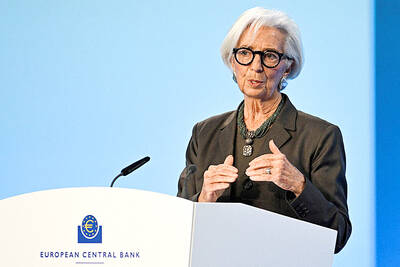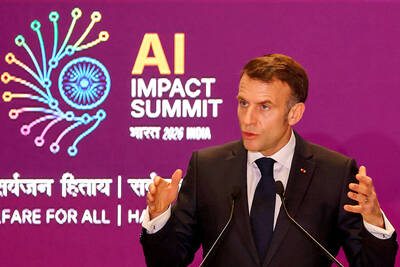Toshiba Corp chief executive officer Satoshi Tsunakawa is stepping down as the embattled Japanese technology giant seeks to restructure and restore its reputation.
Tsunakawa is to be replaced by Taro Shimada, an executive officer and corporate senior vice president, under a decision made at a Toshiba board meeting yesterday, the Tokyo-based company said.
Shimada was an executive at Siemens AG, in Japan and the US, before joining Toshiba in 2018, working in its digital operations.
He faces the challenge of leading a restructuring plan that has drawn criticism from shareholders.
Last month, Toshiba said it plans to split into two companies, one focused on infrastructure and the other on devices.
Shimada said he takes pride in being the first CEO with a background in digital technology and hopes that would be a plus for Toshiba’s energy business.
“I have been at Toshiba for only three years, but I love Toshiba,” he said.
When asked about how he hoped to win over critical shareholders, Shimada said he had learned while working in the US about the importance of communicating as equals, referring to the expression “put yourself in someone else’s shoes.”
The restructuring proposal is still subject to shareholder and regulatory approval. An extraordinary shareholders’ meeting is set for March 24, when the plan is to be put to a vote.
Toshiba officials told reporters that the management change was timed to happen before that, although it was unclear how that might help win over shareholders.
Approval for yesterday’s personnel changes, including a resignation of another board member, and the nomination of two others, is to be sought in a shareholders’ meeting in June, Toshiba said.
Last year, Nobuaki Kurumatani resigned as Toshiba president and Tsunakwa took the helm. Kurumatani had headed global fund CVC Capital Partners’ Japan operations and became CEO in 2018.
Tsunakawa said he had accomplished his mission of handing over the leadership to the next generation and hoped Toshiba’s shareholders, customers and employees would agree with the proposed restructuring plan.
He did not say how the company had dealt with dissent.
“I am confident I was able to hand over the leadership toward Toshiba’s evolution into the future,” he told reporters in an online news conference.
He defended the decision to appoint Toshiba people, not outsiders, to top positions, saying that the company needs to change from within.
This might be Toshiba’s “last chance” to fix its reputation and brand power as a technology company and win back trust, he said.

European Central Bank (ECB) President Christine Lagarde is expected to step down from her role before her eight-year term ends in October next year, the Financial Times reported. Lagarde wants to leave before the French presidential election in April next year, which would allow French President Emmanuel Macron and German Chancellor Friedrich Merz to find her replacement together, the report said, citing an unidentified person familiar with her thoughts on the matter. It is not clear yet when she might exit, the report said. “President Lagarde is totally focused on her mission and has not taken any decision regarding the end of

French President Emmanuel Macron told a global artificial intelligence (AI) summit in India yesterday he was determined to ensure safe oversight of the fast-evolving technology. The EU has led the way for global regulation with its Artificial Intelligence Act, which was adopted in 2024 and is coming into force in phases. “We are determined to continue to shape the rules of the game... with our allies such as India,” Macron said in New Delhi. “Europe is not blindly focused on regulation — Europe is a space for innovation and investment, but it is a safe space.” The AI Impact Summit is the fourth

CONFUSION: Taiwan, Japan and other big exporters are cautiously monitoring the situation, while analysts said more Trump responses ate likely after his loss in court US trading partners in Asia started weighing fresh uncertainties yesterday after President Donald Trump vowed to impose a new tariff on imports, hours after the Supreme Court struck down many of the sweeping levies he used to launch a global trade war. The court’s ruling invalidated a number of tariffs that the Trump administration had imposed on Asian export powerhouses from China and South Korea to Japan and Taiwan, the world’s largest chip maker and a key player in tech supply chains. Within hours, Trump said he would impose a new 10 percent duty on US imports from all countries starting on

STRATEGIC ALLIANCE: The initiative is aimed at protecting semiconductor supply chain resilience to reduce dependence on China-dominated manufacturing hubs India yesterday joined a US-led initiative to strengthen technology cooperation among strategic allies in a move that underscores the nations’ warming ties after a brief strain over New Delhi’s unabated purchase of discounted Russian oil. The decision aligns India closely with Washington’s efforts to build secure supply chains for semiconductors, advanced manufacturing and critical technologies at a time when geopolitical competition with China is intensifying. It also signals a reset in relations following friction over energy trade and tariffs. Nations that have joined the Pax Silica framework include Japan, South Korea, the UK and Israel. “Pax Silica will be a group of nations